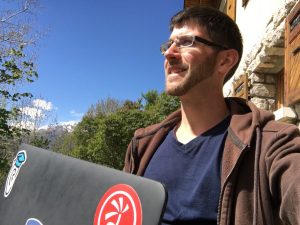 I am not a natural participator.
I am not a natural participator.
I’m an introvert* and my personality type means I prefer just focusing in and doing something myself rather than collaborating with others… Fortunately I grew up with two older sisters who made sure I didn’t turn out entirely asocial.
Put me in a team for a project and I’ll be comfortable working together. I’ll even happily take the lead—though mostly out of impatience for action to be taken!
When it comes to online communities, I’m not a big contributor.
I don’t post YouTube comments, I barely interact with friends and family on Facebook, and though I’m technically a member of dozens of online communities, there are only two or three which I would say I’m an “active member” of.
Since joining the Dynamite Circle three years ago I have posted over 1,000 replies in the forums and started almost 100 discussions myself. I am not just an active member, but actually help out on a voluntary basis as part of the “leadership team”. This month I travelled internationally to attend one of their in-person events.
And here I am, writing a blog post—my first in years**—simply because I love and value this community and want to do whatever I can to help it continue to grow and maintain its incredibly high quality.
So why has the DC had such an impact on my life, when I’m not a natural participator and all those other sites I’m a “member” of have failed to draw me in?
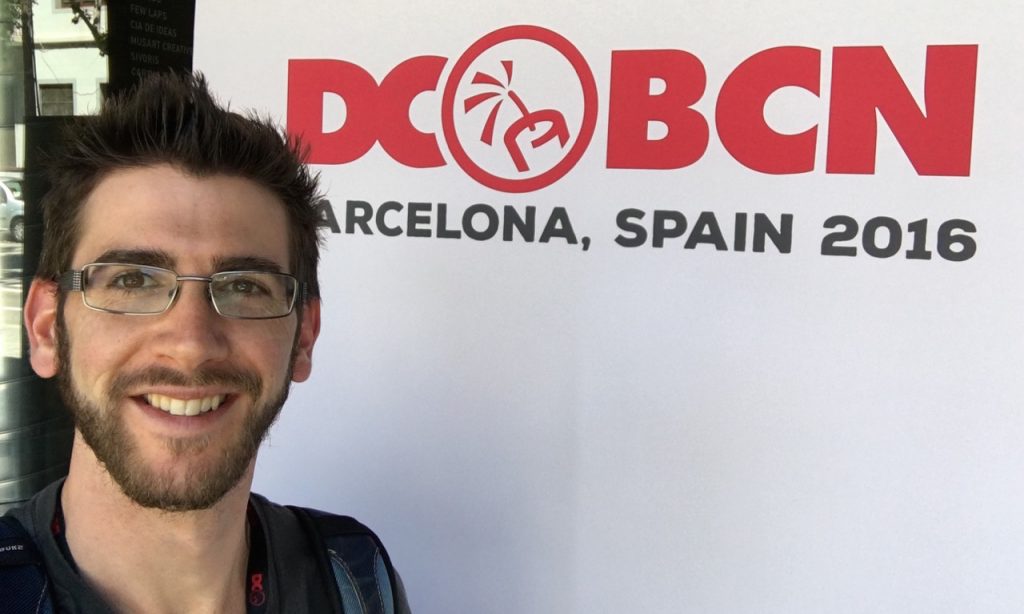
At the DC event in Barcelona this summer
Before we get into that, I should explain how I came to join the DC in the first place…
The London Years
I was living in London when I started my company in 2009, and a lot of people would tell you that London is a great place to start a new technology business.
Yet for the first few years all my efforts to meet with other “entrepreneurs” led me to two types of people:
- Startup founders who were working on a business plan to secure funding from an angel or VC (or who already had).
- Makers who were almost entirely focused on making a thing – and dreamed of it one day making a bit of money too.
I went to OpenCoffee meetups, Silicon Roundabout talks and networking events, I hung out at Google Campus, and my business was even selected to participate in a prestigious 3-month accelerator program.
I’d had pretty good success bootstrapping, but hanging around all these London entrepreneurs left me with the impression that you could either have a “lifestyle business” (meaning a hobby project that just about covered your living costs) or you could spend most of your time and energy running around looking for funding – and then gamble with someone else’s money on a totally unproven business idea.
I was surrounded by “entrepreneurs” but I rarely felt I had much in common with them.
This made my first few years in business pretty lonely. Things were getting kind of bleak.
Discovering the Dynamite Circle
I’d always had great resistance to the term “lifestyle business”. If I was going to start a business it was going to damn well grow big enough to do more than just cover my cost of living!
Ironically, that caused me to avoid the one resource which ultimately rescued me: the Lifestyle Business Podcast, now know as Tropical MBA.
Throughout those first few years, podcasts had actually been my one comfort. Although the big daddy of them all, Mixergy, was focused heavily on venture-funded or later-stage startups, I gradually discovered other shows which were sharing stories of bootstrapped founders managing to grow sizeable businesses.
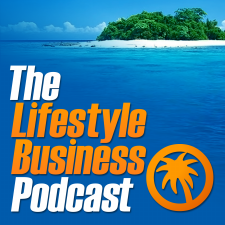 Eventually I gave the Lifestyle Business Podcast a try and was surprised to realise these guys weren’t playing small. They had respect for the “coconut cowboy” but actually were mostly talking about exactly my kind of entrepreneurship.
Eventually I gave the Lifestyle Business Podcast a try and was surprised to realise these guys weren’t playing small. They had respect for the “coconut cowboy” but actually were mostly talking about exactly my kind of entrepreneurship.
Despite their podcast host swagger, Dan and Ian are actually pretty modest guys. As a result it took quite a lot of listening before I realised that there was an online community associated with the podcast, and then it took a bit longer for me to check it out and decide to give it a try.
Although I would never have guessed that online forums would provide the kind of peer support and knowledge exchange I’d been seeking in person at London meetups, once I joined it quickly became clear that this was what I’d been looking for.
After three lonely years getting started in business, I had finally found my people.
Why the DC has had such an impact
 So what is it that makes the Dynamite Circle so special? It’s an online forum, isn’t it? About cat furniture or something?
So what is it that makes the Dynamite Circle so special? It’s an online forum, isn’t it? About cat furniture or something?
Here are a handful of reasons which sprang to mind when I asked myself this question recently.
1. It’s private (ish)
What happens in the DC stays in the DC. That’s about as detailed as the privacy policy gets, but this, combined with the point about barrier-to-entry below, makes it just private enough for DCers to feel comfortable sharing.
People regularly share real numbers relating to their business, from website visitor numbers to email open rates and bottom-line revenue. It’s part of the culture of the community that people write up epic “value bomb” posts, sharing their successes, failures, and the specific strategies and tactics that worked in a particular area.
We’re not talking theoretical “here’s a great idea for how you could run your PPC campaigns”-type posts, like you can find endlessly in the internet marketing world.
These are real case studies, real examples, from people with real businesses.
2. The bar to entry is just high enough
There are a ton of online communities for entrepreneurs. Most are either:
- Public, and crowded with “how can I choose a business idea?!”-type questions from people just starting out.
- Private, publicised, and run by a single “guru”, who everyone else is there to learn from. These tend to attract mid-level entrepreneurs who are willing to spend some money for access to more valuable information and discussions.
- Private, not publicised, and invite-only. These include ad-hoc mastermind groups between peers and some communities you only discover through word of mouth. This tends to be where the top-level people spend their time.
There’s value in all these types of community, but the trouble is that if you’re a mid-level entrepreneur (by which I mean: you’ve been at it a few years, you have your own business, and it’s making at least enough money for you to live on) who doesn’t subscribe to a particular guru, you’re a bit stuck.
You can network, and hope to make connections to get into the right conversations. But I found (in London, at least) there are way too many VC- and Angel-focused startups around for you to easily find bootstrapped internet entrepreneurs (more on this below).
So one thing which sets the DC apart is that there is a decent barrier to entry (both by virtue of it being a paid membership, and because the application committee checks that applicants are up and running with a viable business) but it isn’t centered on the teachings of one guru on one topic.
Dan and Ian act as figureheads—but honestly, it’s fairly rare for them to post something. People join the DC not to follow Dan and Ian, but because they relate to their style of entrepreneur and trust that the community they lead is the right place for them to be.
Some DC members are at an earlier stage than me in their entrepreneurial journey. Many are further ahead. Some are internet famous.
However successful other DCers might be, I can always be confident that if I reach out to them I’ll be met with respect, openness and generosity.
3. There’s a ton of value in there
What I immediately loved about the DC was the combination of high-value discussion and the wide variety of topics covered.
It’s not an internet marketing community.
It’s not a digital nomad community.
It’s not a traditional MBA-style business community, nor a sales, manufacturing or consulting community.
It’s all of these.
Because everybody is of a certain level with their business, and the community spirit is one of abundance and generosity, DCers are constantly cross-pollinating their expertise. Person X is knowledgeable about A and B but not C – so he can turn to person Y because she’s been doing C for years and she’s happy to help.
This works because there are no newbies—only newbies in a particular area. And everybody has the sense not to ask questions they could just Google the answers to. So there’s a really healthy continual exchange of wisdom, from one subject matter expert to another.
Everybody levels up.
Because this has been going on for years, the archive of valuable discussions is astonishing. From philosophical topics like lifestyle design to nitty-gritty SEO tactics, you arrive in the DC and you’re presented with the most useful and high-value library of modern business wisdom I’ve ever come across.
And whenever you find an old discussion on a topic you’re interested in and think “wow”, you’ll find most of the people who have contributed to it are still around, continuing to deliver value and generously help out other DCers. The conversation continues.
 Am I nervous, being so open about my own business?
Am I nervous, being so open about my own business?
Not really.
Sure, there is a danger that one of my competitors will join and learn all kinds of thing about my business – but that risk is far outweighed by the huge benefit I’ve got from sharing my experiences and questions inside the DC and hearing back from more experienced entrepreneurs over the last few years. And I have a pretty great relationships with my main “competitors” anyway (there’s that abundance mindset I mentioned earlier in action…)
4. It’s relevant
As a solo founder you need to wear a lot of hats. Product development, customer support, sales and marketing, project management, HR, book-keeping… Here’s one of my first posts in the DC, in fact:
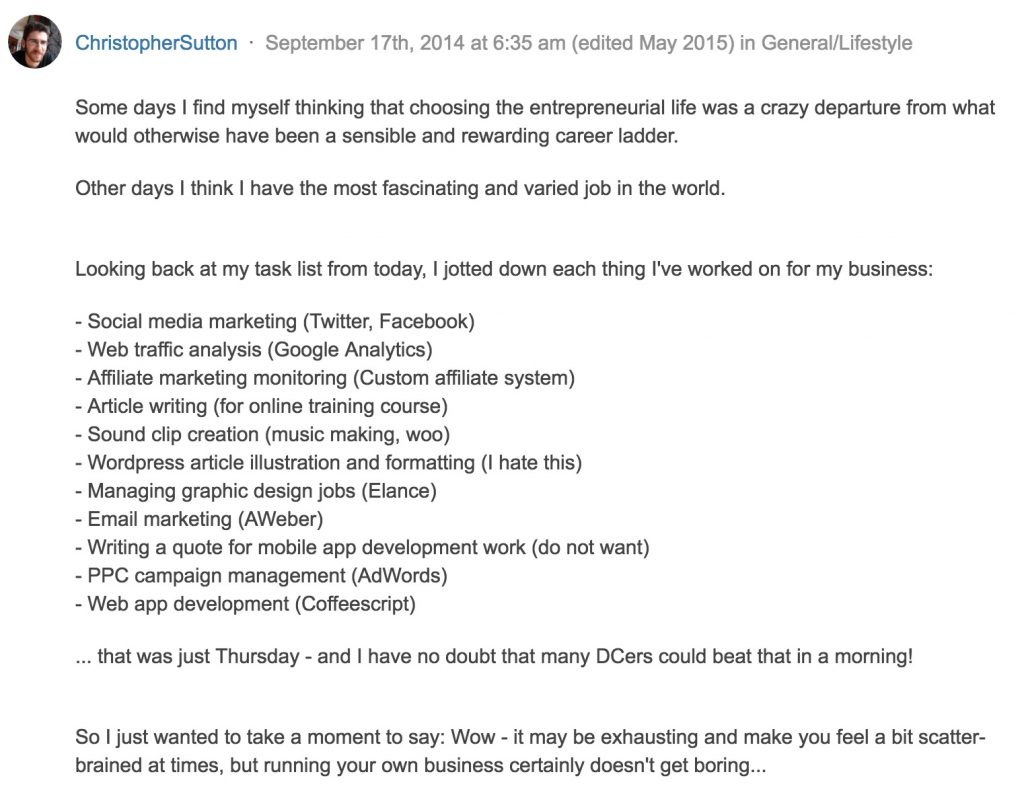
There are a lot of different topics you need to learn about, many are changing at the pace of the web, and very few of them are covered in traditional business education.
Before joining the DC I was cobbling together what I needed to know from books, blogs and podcasts. I still do learn an enormous amount from those three media, and of course the wide wild world of the web is always open, covering every topic under the sun. But there is no single place apart from the DC I can turn to which covers all of the topics relevant to me—and very few which aren’t.
Here are some examples of topics I’ve started discussions on inside the DC:
- [CASE STUDY] Increased Organic Traffic 2.6x With On-Site SEO
- Make Better Decisions: Put A Number On It.
- Highly Recommended: SendOwl for Digital Delivery
- Do you add a [PREFIX] to your autoresponder subject lines?
- Launching a B2C Product Over the Holidays: Yea or Nay?
- You can do the very best you can when you’re very, very relaxed
- Travelling with kids: Share your tips and tricks
- Ideas for end-of-funnel PPC retargeting
I limited the list above to my own posts to respect the private-ish nature of the DC, but beyond this there are endless posts outside my particular focus or expertise, ranging from sales and cold-calling, to running an agency, to manufacturing in China.
5. Direct impact on my business
Dan Andrews recently started a new discussion in the community, inviting people to share their “DC Success Stories”. There were a terrific variety of inspiring examples there, but as I wrote my own reply it really hammered home to me the impact that joining the DC has had on my own business.
Before joining the DC:
- My business was up and running—but revenue was highly unpredictable.
- I could just about cover my costs living in London and did occasional consultancy to make up the difference.
- I had an email list of a couple of thousand, a smorgasbord of products and product ideas in various stages of development, and very little idea of how to market any of it.
- I felt pretty alone a lot of the time and regularly struggled with entrepreneurial depression***.
Flash forward to today.
Since joining the DC:
- My web traffic has grown 500%.
- My email list has grown by a factor of 40x (that’s not a typo).
- My product line has been greatly simplified, bringing benefits to me and to the customer.
- I actually have a handle on how to market and sell my product.
- I’ve hired a business coach (also a member of the DC) who has helped me understand myself and my business better
- I have vastly more confidence and stability of mood when it comes to business.
I can directly attribute these dramatic changes to my membership in the DC.
Specifically:
- The valuable posts inside which taught me specific lessons about every aspect of modern business.
- The connections to trustworthy and capable service providers for a variety of business areas I’ve hired for.
- The mastermind groups I’ve been part of, sharing a weekly 1-hour video call with a small group of smart, experienced businesspeople.
I’m also in better physical shape than I’ve ever been in my life, and I have a much deeper understanding of my mind and my spirituality. I’m travelling more and (as the pictures in this post demonstrate) my “office” these days can be pretty amazing:
(#sorrynotsorry)
All these changes I can trace back to my membership of the DC.
6. These people have become my friends
It’s a classic line in the world of membership sites: “They come for the content and stay for the community”.
This is half-true for me with the DC. I came for the content, I’ve stayed for the community. But actually, I’ve stayed for the content too.
Am I learning from the forums themselves as much now as when I first joined three years ago? Probably not. But I am still getting a ton of value from them, probably more so than any other site I visit regularly, and I now get even more value from talking directly other DCers.
Ultimately though, even if there were no new discussions on practical business topics, I’d be staying in the DC community.
Because these people have become my friends.
I am still in touch with a lot of my friends from school and university, and I hope to stay close with them for the rest of my life.
But these days it’s DCers that I relate most easily to, can have the most interesting conversations with, and most look forward to seeing in person.
These are my people, and I’m deeply grateful for the Dynamite Circle for letting me find them.
It’s hard for me to imagine how my business would have developed over the last few years without the DC.
I’d like to think I would have found alternative sources of support, education and insight, and that my business would still have survived and grown. But honestly, I’m not sure.
Back in the bleak London years my mum would occasionally notice (more perceptively than I realised) that I was a bit lonely in it all and say to me how she wished I had someone to work with, to share in the ups and downs. I would explain how it’s not so easy to find a co-founder who is likeable, trustworthy, complements my skillset and oh – just happens to have a passion for musical ear training.
It turns out there was another solution.
I’ve enjoyed being a member of the DC since day one, but it’s only in the last few months that I realised just how profound a positive impact joining this community has had on my life.
Oh, and those other two or three communities I mentioned at the start, where I would say I’m an “active member”? When I stopped to think about it I realised they are actually all spin-offs from the DC.
So I decided it was high time I said publicly: The DC has changed my business and life dramatically for the better.
It’s my small hope that if there are entrepreneurs out there like I was a few years ago, going along to meetups and listening to podcasts, hoping to find people they can actually connect with and relate to, people they can share the entrepreneurial rollercoaster with… I hope they might stumble across this post, give the Tropical MBA a listen, and cast an eye towards the Dynamite Circle.
Footnotes
* By Susan Cain’s definition.
** It’s not a coincidence that I last posted here on my personal blog about three years ago. Since then all my music-related writing has been on EasyEarTraining.com or in the Musical U community. My thoughts on business and pretty much everything else has gone into the DC, or been shared in private subgroups of DCers. If you’ve been wondering why this blog hasn’t been updated, I’m afraid the DC is to blame.
*** This turns out to be a thing. One of the useful coping mechanisms I’ve found is remembering that other founders go through it too:
- http://sonictruths.net/2013/05/surely-you-will-be-saved-one-day/ ← my own post
- http://muddylemon.com/2011/05/depression-burn-out-and-writing-code/
- http://businessofsoftware.org/2013/11/developers-entrepreneurs-depression-a-wonderful-talk-at-business-of-software-conference/
- http://humbledmba.com/obliterate-startup-depression
- http://calacanis.com/2008/09/29/the-startup-depression/
- https://news.ycombinator.com/item?id=3265601
- http://betabeat.com/2011/11/u-cant-haz-sadz-the-hushed-dangers-of-startup-depression/?show=all
- https://news.ycombinator.com/item?id=4928031
- http://fizzle.co/sparkline/write-depression-anxiety-entrepreneurship
- http://zakhomuth.com/post/49176400386/sad-tired-and-alone-my-ongoing-battle-with-st-39237
- http://fourhourworkweek.com/2008/10/03/harnessing-entrepreneurial-manic-depression-making-the-rollercoaster-work-for-you/
- http://hyperboleandahalf.blogspot.co.uk/2011/10/adventures-in-depression.html
- http://hyperboleandahalf.blogspot.co.uk/2013/05/depression-part-two.html
- http://www.betabeat.com/2011/11/30/startup-depression-11302011/?show=all
[Edit] 2016.07.29: Added paragraph to “The bar to entry is just high enough” section and inserted a missing item into “how my business has transformed” list.

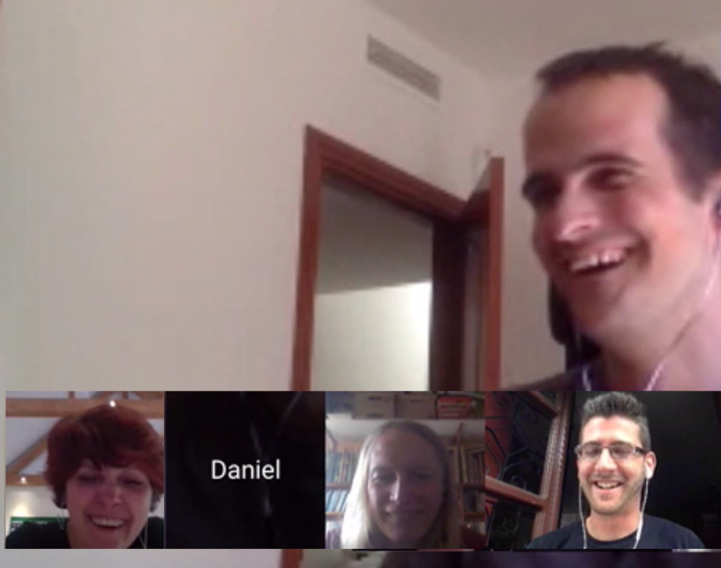
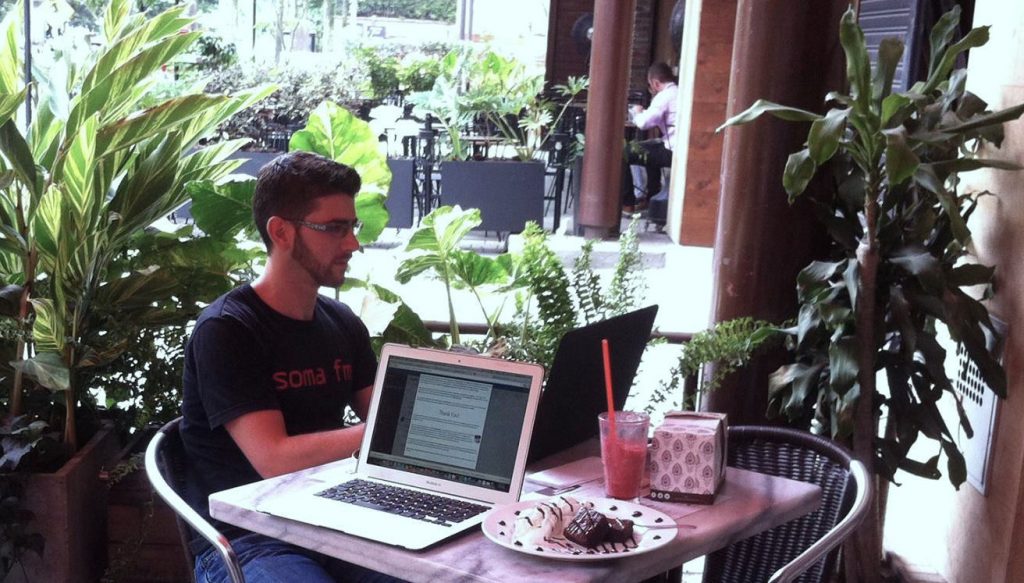
 My name's Christopher Sutton and this is my personal blog. You can learn more about me
My name's Christopher Sutton and this is my personal blog. You can learn more about me